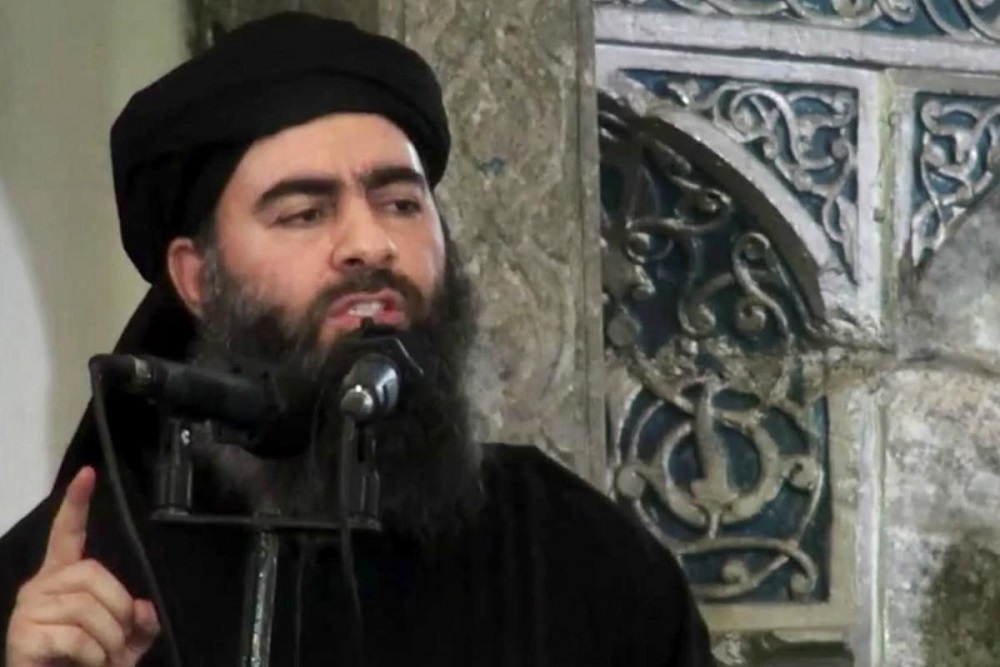Beirut – Various reports on Tuesday asserted the death of ISIS leader Abu Bakr al-Baghdadi, while the terrorist group did not confirm or deny them as it lost its stronghold in the Iraqi city of Mosul to advancing US-backed Iraqi forces.
A source in Iraq’s Nineveh province confirmed his death, adding that the group will later announce his successor. The Syrian Observatory for Human Rights also confirmed the development.
ISIS expert Ahmed Ramadan however was skeptical, saying that there are three Baghdadi “lookalikes” present in the remaining areas under the group’s control in Syria and Iraq.
One of his lookalikes was twice targeted in air strikes in Syria’s Deir al-Zour countryside, but he still lives, he revealed to Asharq Al-Awsat.
“At any rate, Baghdadi is not running ISIS, but a 12-member panel is,” said the expert, adding that the group therefore has no problem in announcing its leader’s death.
Another informed source on the organization said that Baghdadi was last seen two-and-a-half months ago in the al-Qaem desert in Iraq where he was inspecting a training camp.
Baghdadi has only made one public appearance when he made his infamous speech at Mosul’s Grand al-Nuri Mosque in July 2014. He also released a voice recording in November 2016.
The Russian Defense Ministry had in June said that it had likely killed Baghdadi in an air raid against an ISIS gathering on the outskirts of Syria’s Raqqa city, but it could not confirm it.
The Pentagon on Tuesday said that the US did not have information to confirm Baghdadi’s death.
Researcher on extremist groups Abdul Rahman al-Hajj doubted that the ISIS leader was killed, saying that the information “does not seem trusted.”
The information is based on a “document” that was found in Mosul, he added.
This document spoke of the search for a new leader for the group and urged ISIS members to stand united, he explained to Asharq Al-Awsat.
Baghdadi’s fate remains vague, he acknowledged, noting that the terror group had not yet issued a statement to deny his demise.
The 46-year-old Iraqi, nicknamed “The Ghost”, has not appeared in public since his al-Nuri Mosque sermon, reported Agence France Presse.
Keeping a low profile — in contrast to slain Al-Qaeda leader Osama bin Laden — helped Baghdadi to survive for years despite a $25-million US bounty on his head.
Ibrahim Awad al-Badri came from modest beginnings to became the overlord of an extremist organization.
He was born in Samarra, north of Baghdad. His high school results were not good enough for law school and his poor eyesight prevented him from joining the army. So he moved to Baghdad to study religion, settling in the neighborhood of Tobchi.
After US-led forces invaded Iraq in 2003, he founded his own insurgent outfit. It never carried out major attacks, however, and by the time he was arrested in February 2004 and detained at the US military’s Camp Bucca, he was still very much a second or third-tier extremist.
The prison in southern Iraq was where he started showing signs of leadership.
He was released at the end of 2004 for lack of evidence. Iraqi security services arrested him twice subsequently, in 2007 and 2012, but let him go because they did not know who he was.
In 2005, he pledged allegiance to Abu Musab al-Zarqawi, the brutal leader of the local Al-Qaeda franchise. Zarqawi was killed by an American drone strike in 2006. After his successor was also eliminated, Baghdadi took the helm of the group in 2010.
He revived ISIS later declaring it independent of Al-Qaeda, expanding into Syria in 2013 then launching a sweeping offensive across northern Iraq in 2014.
Baghdadi had grown up in a family divided between a religious clan and officers loyal to Saddam Hussein’s secular Baath party.
Years later, his terror organization was to incorporate ex-Baathists, capitalizing on the bitterness many officers felt after the American decision to dissolve the Iraqi army in 2003.
That gave his leadership the military legitimacy he personally lacked and formed a solid backbone of what was to become ISIS, combining extreme religious propaganda with ferocious guerrilla efficiency.
Uncharismatic and an average orator, Baghdadi was described by his repudiated ex-wife as a “normal family man” who was good with children. He is thought to have had three wives.
